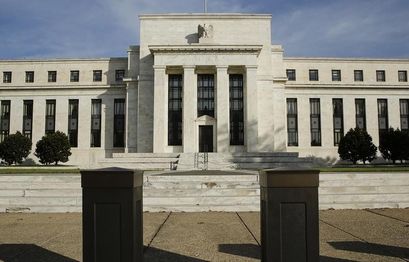Why the SEC – and your state or country’s regulator – now need their own innovation unit
Everyone laughed. I understood. ‘Regulator’ and ‘innovation’ just don’t go together. Fish and bicycles right?
Having earlier challenged them about their dirty-PR tactics smearing all of crowdfunding as their first pronouncement on the matter in August 2012 I wrote and published this article explaining why the UK regulator should create an innovation unit. I expected and understood the hilarity this evoked from almost every quarter – including, I’m sure, Canary Wharf.
Regulators swim in the opposite direction. They’re ‘brake men’ unaccustomed to thinking about the impact this has – especially the real but unquantified and sometimes unquantifiable impacts, let alone the ‘opportunity costs’ that the rest of us routinely factor in. They have a difficult and often unpopular job and perhaps understandably tend to just do the job that’s in front of them.
“Innovation is absolutely vital to our economy and our recovery and crowdfunding is the spearhead of that, or soon could be. Which means that our economy has to be able to encompass both good regulation – to limit the predators – and real innovation over a wide area. With as little of the first and as much or the second as possible.
This is no small matter and could be crucial to our future as a nation. So, why shouldn’t the FSA (now the FCA), as an organisation, encompass both? To have a small unit whose job it is to challenge and balance the thinking of the regulator right in there at the start of things could make a huge difference to the outcome by tempering the early thinking and bringing a new perspective right to the table where the key discussions are.”
Just over 18 months later (May 2014) the same regulator announced and has now opened it’s Innovation Unit – In the meantime UK Chancellor (ie. finance minister) George Osborne switched the government’s position away from a cautious ‘light touch’ that nevertheless treated these upstart innovators as potential miscreants who must be ‘up to something’ just like all the others – with the regulator clearly on a wait for the deluge (then we can pounce) tack. (Pounce they did – needlessly as it turned out – but that’s another story).
He radically changed tack after commissioning a review, and backing the launch of a new body, Innovate Finance, in August 2014 saying that henceforth “Regulation has to be pro-innovation” and London and the UK must lead the world in FinTech – not least to protect the leading role of London globally. In order to do so it must actively embrace and accommodate innovation. A reversal unlikely to be popular at the FCA’s Canary Wharf HQ for the reasons above: It adds a new layer, a new dimension, to their job.
“Regulation has to be pro-innovation…
We have a long history of leading the way in financial innovation – from the first insurance market and the invention of joint stock companies centuries ago, to our rapid emergence now as the Western centre for new global currencies… with the right backing from government, I believe we can make London the FinTech capital of the world.
For me this is not an add-on to what the City already does. It has to be what the City becomes in the future. It means being able to bypass traditional banks altogether, and lend money directly – through peer-to-peer platforms like Funding Circle and Zopa…
FinTech will transform the way we do business, and UK companies are already leading the way. But we must not be complacent – or think that Britain has some innate right to lead the world. And I’m here today to announce new measures to back you in all these areas.
“We’re backing you by creating a regulatory environment that gives new entrants the chance to succeed…and the FCA has committed to open its doors to financial service firms who are developing new approaches, to help them navigate the regulatory system and identify areas where the regulatory system needs to adapt to new technology. …
“These are positive developments that I hope will help us create the right, pro-innovation regulatory environment.”
UK Chancellor George Osborne, August 2014 launching new FinTech body Innovate Finance
This in the face of an existing industry association, The UKCFA, that had consistently since it’s inception called for regulation in the traditional mould, and routinely ‘cautiously welcomed’ whatever came it’s way without further demur. The obvious question being why? We’ll come back to that.
So why does the SEC and every national financial regulator need an innovation unit. Simply to pursue London? No.
In a word: FinTech. The ‘wunderkind’ that Sir Mark Walport uncovered (to government eyes at least) when he conducted his review for the UK Chancellor. Not a new invention – except perhaps the word itself – but a culmination.
This is of course only a part of the story – one slice through what is a fundamental global change that has been underway and building to this point for decades since the Internet became a public highway.
FinTech: Not a new invention but a culmination, a fundamental global change under-weigh and building for decades, since the Internet became a public highway.
But it constitutes a sea-change in the understanding within government of the importance of what’s now happening, how fundamental it is, and its potential to alter, transform, the world as we know it. Especially the world pecking order. A world that has been tipped on it’s head from one seeking stability and a mechanistic kind of perfection to one of dynamism and ever-evolving change. From one driven by the needs and desires of its behemoth suppliers (and the governments which are their clients) to a new kind of eco-system driven by the market, the crowd. Driven by demand.
That fundamental shift had long been evident (think music, publishing, …) and is progressive and irreversible. It changes, fundamentally, not just the relationships between suppliers and consumers – people – but the whole basis and drivers of the economy.
Innovation Unleashed: This revolution can no longer be contained by any national government
Crucially it unleashes innovation in a new way. A way that cannot be contained, outlawed or regulated away. At least not in a democracy – and China and the rest of the world are showing little or no resistance either. For good reasons. The advantages – not least the economic advantages – are as massive as they are irresistible and global.
Which means that this revolution cannot be contained by any national government. At least not as long as there is at least one other willing to break ranks to embrace and exploit it. Neither does it need to be a ‘major trading nation’ or similar – just have a desire to enhance their position in the world.. and maybe become one. There are no shortage of contenders and candidates. Take a look at the innovative, global, thinking already publicly evident from tiny Estonia for example.
FinTech is only the name for the most visible protuberance of what is a global tectonic shift that cannot be resisted or outlawed – at least in the medium and long term – by national governments or their regulators.
As the UK government have realized the penalty for resistance is to be left behind – and the longer you resist the further behind. With consequences that are incalculable from where we now stand but likely severe and for some economies potentially close to catastrophic for the populace – and very publicly so.
So why has this not been more widely recognized? The roots run deep – deeper than we are accustomed to thinking about on a tactical or even strategic basis. This is the kind of change that comes about only every couple of hundred years or so (as I documented here) and invariable comes as a shock and elicits surprise and usually opposition and denial.
Too much is invested, and built on, the foundations that are now crumbling and being replaced.
It’s the kind of change the world was eagerly expecting, hoping for, pre the 2000 bubble-burst – and was disappointed. Stalled for a while it went underground and has been building ever since to the seismic events now under-weigh. So we are all – including governments – now poorly prepared. Evidence the unseemly scramble by banks, sniffing the air and gradually waking to a new environment in which they are uncomprehendingly – probably fruitlessly, from their own viewpoint at least – setting up FinTech ‘incubators’ and ‘accelerators’ across the world, like a global rash.
Myopia, short termism and self interest don’t help, with governments mostly worrying about the next news and election cycles. With a five year election cycle just started in the UK the level of interest and action hints the timing now. How different did the world look five years ago – before this all broke? How different will it look four or five years from now – with finance and even money being reinvented by the mass of projects initiatives and ventures we now call FinTech – accelerated by the VC money now pouring in, and government support as well?
It doesn’t take long for some insurgents to become aspiring incumbents…
Self interest because it turns out it doesn’t take long for some insurgents to become aspiring incumbents. Companies created on a wave of innovation, optimism and even democratization that suddenly see the possibility of not just living at the top of the hill but owning it… and regulation as a tried and tested means to acquire and defend that position.
Tempting as this is, and it has worked in more ‘normal’ times, the changes are too deep and the horizons and new territory so large, practically limitless in fact, that they risk being out-innovated and left behind.
So what of regulation? Imagine if you will a routine planning meeting – or for that matter a board meeting – at the regulator’s HQ. How likely is it that innovation and lost opportunities would be on the agenda? Or near the top? Unless outside pressures make this an imperative?
Regulators: “Who guards the guards (when they’re ‘independent’ of government) or can hold them to account or challenge their thinking?”
Who guards the guards – especially when they’re allegedly ‘independent’ of government?. Who can hold them to account on this – or anything? Or challenge their thinking? Not those they oversee – that’s for sure. Politicians? No. Consumers? Innovators? Theoretically, perhaps, but in practice this simply does not happen.
Which is why all regulators, to cope with the years to come, and to not become a drag on the economies and people they’re there to serve urgently need an innovation voice around the top table. As they now have at the FCA – even of they are still thinking only skin-deep, and turning a deaf ear.








